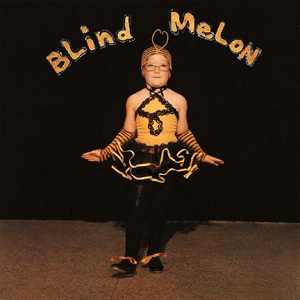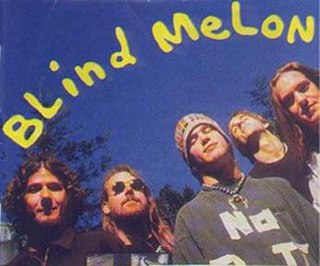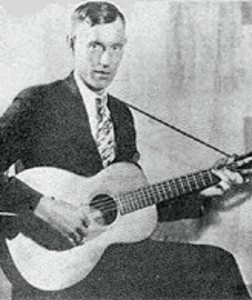
Blind Willie McTell was a Piedmont blues and ragtime singer and guitarist. He played with a fluid, syncopated fingerstyle guitar technique, common among many exponents of Piedmont blues. Unlike his contemporaries, he came to use twelve-string guitars exclusively. McTell was also an adept slide guitarist, unusual among ragtime bluesmen. His vocal style, a smooth and often laid-back tenor, differed greatly from many of the harsher voices of Delta bluesmen such as Charley Patton. McTell performed in various musical styles, including blues, ragtime, religious music and hokum.

Lemon Henry "Blind Lemon" Jefferson was an American blues and gospel singer-songwriter and musician. He was one of the most popular blues singers of the 1920s and has been called the "Father of the Texas Blues".

Blind Melon is the debut studio album by American rock band Blind Melon, released on September 22, 1992 through Capitol Records. "No Rain" became Blind Melon's breakthrough single.

Blind Melon is an American rock band formed in 1990 in Los Angeles by five musicians: three from Mississippi, one from Pennsylvania and one from Indiana. The band currently consists of guitarists Rogers Stevens and Christopher Thorn, drummer Glen Graham, vocalist Travis Warren and bassist Nathan Towne. They are best known for their 1993 hit "No Rain", and enjoyed critical and commercial success in the early 1990s with their neo-psychedelic take on alternative rock.

John Henry is an American folk hero. An African American, he is said to have worked as a "steel-driving man"—a man tasked with hammering a steel drill into rock to make holes for explosives to blast the rock in constructing a railroad tunnel.

Thomas "Blind Tom" Wiggins was an American pianist and composer. He had numerous original compositions published and had a lengthy and largely successful performing career throughout the United States. During the 19th century, he was one of the best-known American performing pianists and one of the best-known African-American musicians.

Lowell Thomas George was an American singer, songwriter, multi-instrumentalist, and record producer, who was the primary guitarist, vocalist, songwriter and founder/leader for the rock band Little Feat.

The Chesapeake and Ohio Railway was a Class I railroad formed in 1869 in Virginia from several smaller Virginia railroads begun in the 19th century. Led by industrialist Collis P. Huntington, it reached from Virginia's capital city of Richmond to the Ohio River by 1873, where the railroad town of Huntington, West Virginia, was named for him.

The Blind Boys of Alabama, also billed as The Five Blind Boys of Alabama, and Clarence Fountain and the Blind Boys of Alabama, is an American gospel group. The group was founded in 1939 in Talladega, Alabama, and has featured a changing roster of musicians over its history, the majority of whom are or were vision impaired.

Frank Hutchison was an American early country blues and Piedmont blues musician and songwriter. Okeh Records promotional materials referred to him as “The Pride of West Virginia,” and he is thought to be the first non-African American musician to record in the country blues idiom. Hutchison was best known as a slide guitar player, where he held the guitar in his lap and used a pen knife as a slide.

Robert White was an American military officer, lawyer, and politician in the U.S. state of West Virginia. White served as Attorney General of West Virginia (1877–1881) and served two terms in the West Virginia House of Delegates, representing Ohio County in 1885 and 1891.
"Hickory Wind" is a song written by country rock artist Gram Parsons and former International Submarine Band member Bob Buchanan. The song was written on a train ride the pair took from Florida to Los Angeles in early 1968, and first appeared on The Byrds' Sweetheart of the Rodeo album. Despite Buchanan's input, "Hickory Wind" is generally considered to be Parsons' signature song. Parsons' decision to play "Hickory Wind" instead of the planned Merle Haggard cover "Life in Prison" during The Byrds' performance at the Grand Ole Opry on March 15, 1968 "pissed off the country music establishment" and stunned Opry regulars to such an extent that the song is now considered essential to Parsons' legend.
Christopher Allen Bouchillon was an American country music and blues musician from South Carolina, who is often credited with being the originator of the talking blues musical style.
Blind Alfred Reed was an American folk, country, and old-time musician and singer-songwriter. He was one of the artists who recorded at the Bristol Sessions in 1927, alongside more famous names such as Jimmie Rodgers and The Carter Family. He played the fiddle along with his son Arville, who played the guitar. He is perhaps most well known for the songs "The Wreck of the Virginian" and "How Can a Poor Man Stand Such Times and Live?", the latter of which has been covered many times, including versions by Bruce Springsteen, Ry Cooder, and the New Lost City Ramblers.
"The Wreck of the Virginian" is an American folk song by Blind Alfred Reed recorded on July 28, 1927. The song describes a train wreck in Ingleside, West Virginia. The lyrics, which are essentially documentary, describe how, on "a bright Spring morning on the twenty-fourth of May," 1927, the engineer, E. G. Aldrich of Roanoke, Virginia, known as "Dad," and his fireman, Frank M. O'Neill of Pax, West Virginia, running train number three, "left Roanoke en route for Huntington." Then, "at eleven fifty-two that day, they just left Ingleside," when "an east-bound freight crushed into them." and they were both killed. The song also notes that "Dad" Aldritch had been an engineer on the line since 1906.
Joshua Andrew Krajcik is an American singer-songwriter who currently resides in Columbus, Ohio. He began his career as a solo artist and later went on to form the Josh Krajcik Band with Corey Gillen and Mitch Pinkston. He was the runner-up in the first season of The X Factor USA in 2011.

Lydia Loveless is an American alternative country singer-songwriter from Columbus, Ohio. Her music combines pop music, classic country, honky tonk, and punk rock.

Christopher Franklin Jamison, better known as Chris Jamison is an American singer-songwriter best known for his appearance in season 7 of NBC's reality TV singing competition The Voice on Adam Levine's team.
Charles Everett Lively was an American private detective who worked as a labor spy for the Baldwin–Felts Detective Agency. He played an active role in the Coal Wars in Appalachia and Colorado during the early 20th century.
George McKinley Reneau was an American blind street musician who became one of country music's earliest recording artists. Known as "The Blind Musician of the Smoky Mountains", Reneau recorded more than 50 songs on the Vocalion and Edison labels in the mid-1920s. While he is credited on his early recordings as a solo artist on vocals, guitar and harmonica, the singing on many if not most of his songs was by an uncredited Gene Austin, a vaudville performer and Tin Pan Alley composer who would became one of the most successful recording artists of the era.













